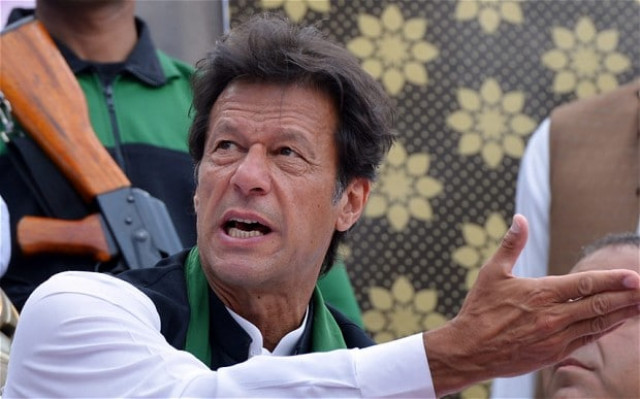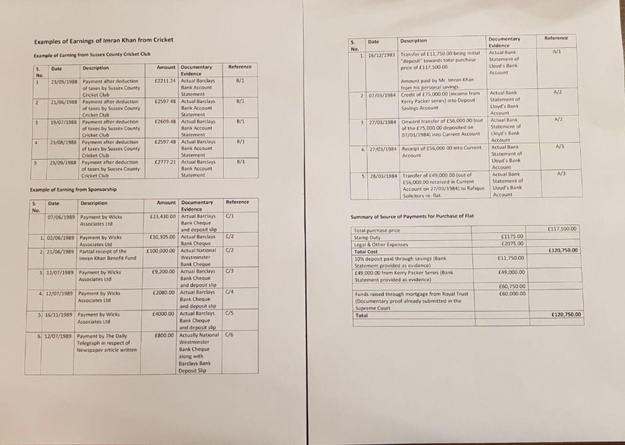How do we apply Article 62, judge asks Imran’s counsel
'Now, you have to tell us: are you honest or dishonest by availing the tax amnesty scheme in 2002?'

PTI chairman Imran Khan. PHOTO: AFP/FILE
A three-justice bench – headed by Chief Justice Mian Saqib Nisar – was hearing a petition filed by PML-N politician Hanif Abbasi, which seeks disqualification of PTI Chairman Imran Khan and Secretary General Jahangir Tareen for non-disclosure of assets, existence of offshore companies and receipt of foreign funding.
Justice Umar Ata Bandial, while referring to the April 20 judgment in the Panamagate case, observed: “There are two views regarding applicability of Article 62(1)(f): that a person shall not be qualified to be elected or chosen as a member of Majlis-e-Shoora (parliament) unless he is sagacious, righteous and non-profligate, honest and ameen, and there being no declaration to the contrary by a court of law.”
The judge told the counsel for the PTI chief Naeem Bukhari: “One is the minority view [authored by Justice Asif Saeed Khosa], which is based on morality and Haqooq-ul-Allah and Haqooq-ul-Ibad.”
“The second is the majority judgment, wherein it is stated that violation of legal obligation is necessary for the applicability of Article 62(1)(F) of the Constitution.”
“Now, you have to tell us: are you honest or dishonest by availing the tax amnesty scheme in 2002?” Justice Umar asked Bukhari.
Bukhari reminded the court that “Justice Azmat Saeed’s additional note observes that Article 62(1)(f) of the Constitution cannot be permitted to be used as a tool for political engineering by the court nor should this court arrogate unto itself the power to vet candidates on moral grounds, like a Council of Elders as is done in a neighbouring country.”
SC seeks money trail of Imran’s London flat
“Under our constitutional dispensation, Pakistan is to be governed by representatives chosen by the people -- not chosen by any institution or a few individuals,” says Justice Azmat in his note.
The counsel, while referring to Justice Azmat’s note, contended that an MP could be disqualified if he violates any legal obligation.
He also told the bench that his client [Imran Khan] had disclosed his London flat in his nomination papers for the 2002 general elections. “Therefore, there is no case of concealment of assets.”
Justice Umar observed that tax evasion was not the only ground for the applicability of Article 62(1)(f), adding mis-declaration on the nomination paper of a candidate also triggered disqualification of any parliamentarian.
Meanwhile, Bukhari submitted complete bank records to establish the money trail in relation to the purchase of the London apartment. “Now, I have the actual banking transaction regarding the purchase of the Landon flat.”
Following the submission of the money trail by Imran’s counsel, Chief Justice Mian Saqib Nisar observed that it was not the case that Imran Khan was involved in money laundering.
The chief justice said the court has sought information from him for its satisfaction.
However, the counsel for the petitioner Akram Sheikh, alleged that fabricated documents had been submitted by the respondent, adding that the bank records submitted were not certified.
Upon this, Bukhari sought time to submit verified documents from London. He also informed that some of the banks have also been closed; “therefore, it is difficult to get the certified record.”
However, the bench observed that when the banks have been closed how they got the banking transaction record. Upon this, Bukhari said they got it from accountants.
On a query, he contended that there was no contradiction between Imran’s speech and his ex-wife’s interview, which had been circulated on social media.
The counsel, however, admitted that there was no documentary record regarding the transfer of $100,000 from Jemima’s account in Rashid Khan’s account. “Likewise, there is documentary evidence that how both Jemima and Rashid Khan settled $26,000.”
The bench will start hearing the plea, seeking disqualification of PTI general-secretary Jahangir Khan Tareen from today (Wednesday).
 One of the documents submitted by Imran Khan in Supreme Court.
One of the documents submitted by Imran Khan in Supreme Court.Will provide complete money trail for purchase of property in SC: Imran
Bukhari said Imran had declared the London flat in his nomination papers for the 2002 elections.
Further, the counsel for Pakistan Muslim League-Nawaz (PML-N), Akram Sheikh, alleged that fabricated documents have been submitted by the respondent adding that the bank transaction records submitted are not authentic. Upon this, Bukhari sought time to submit verified documents from London.



















COMMENTS
Comments are moderated and generally will be posted if they are on-topic and not abusive.
For more information, please see our Comments FAQ